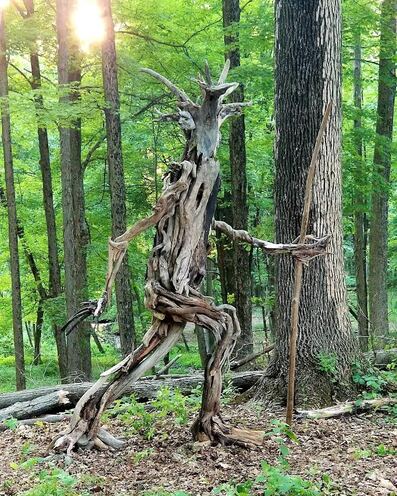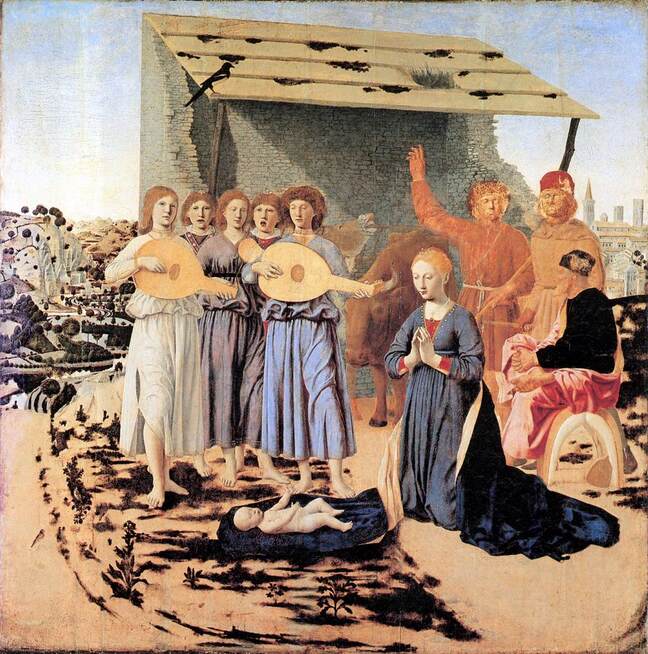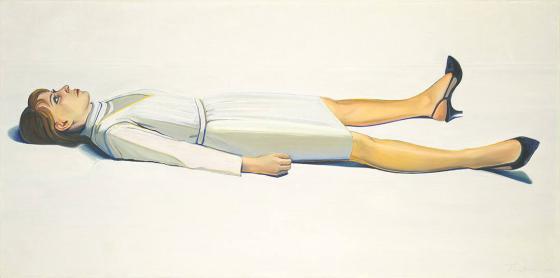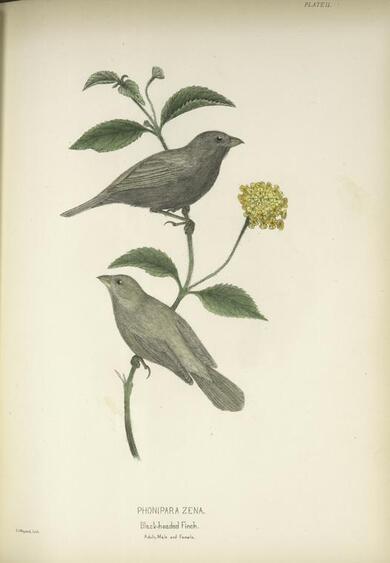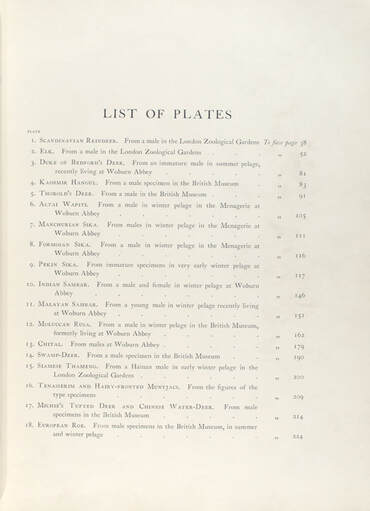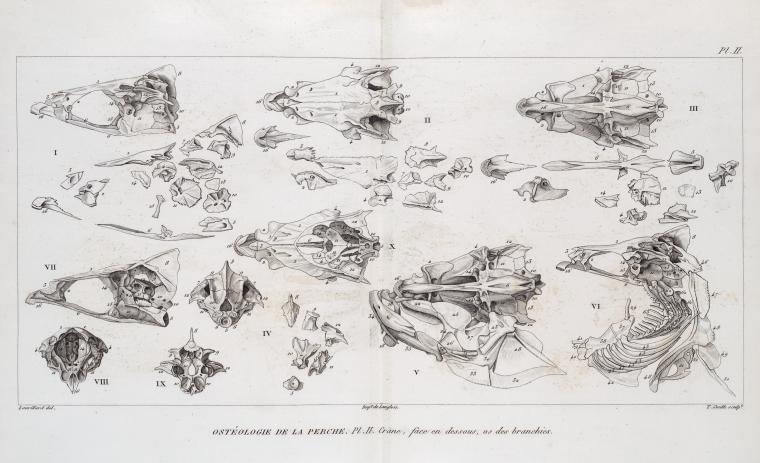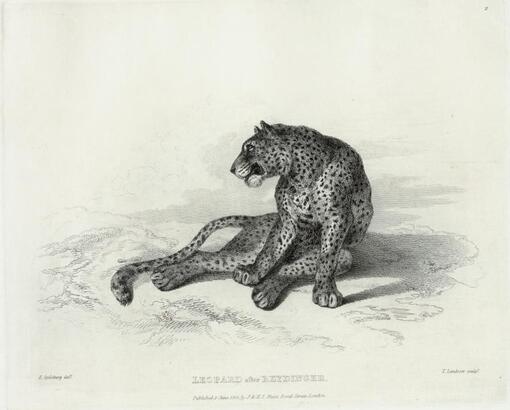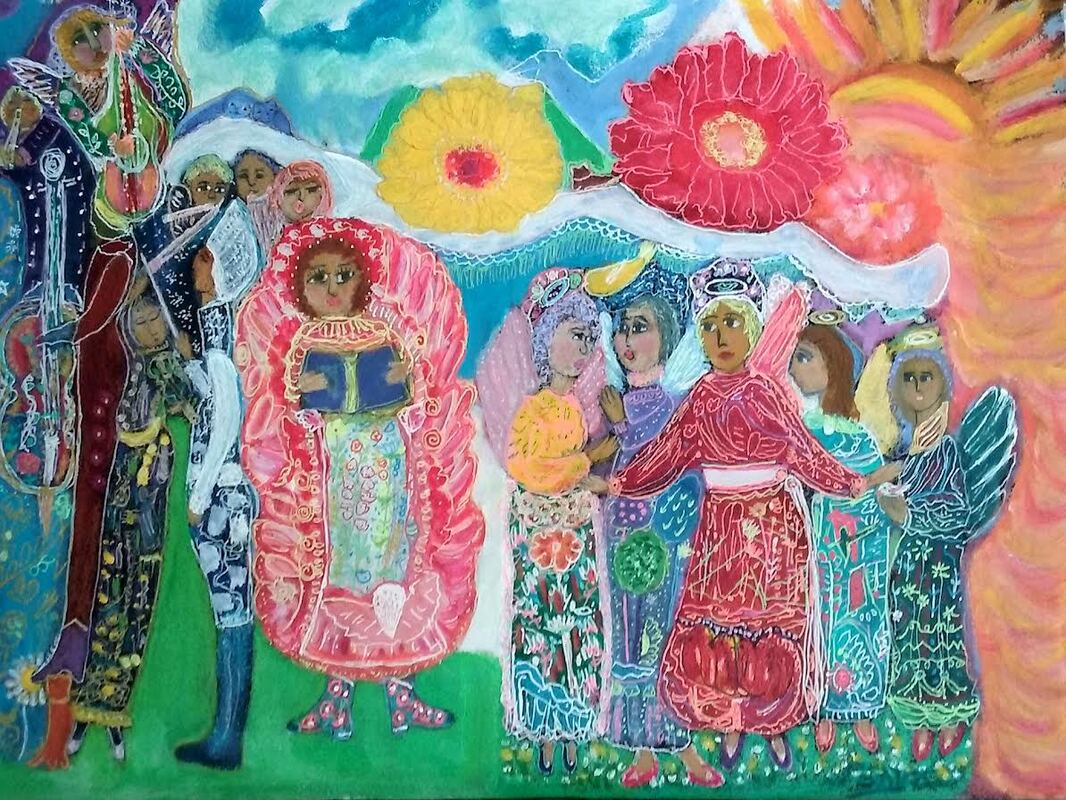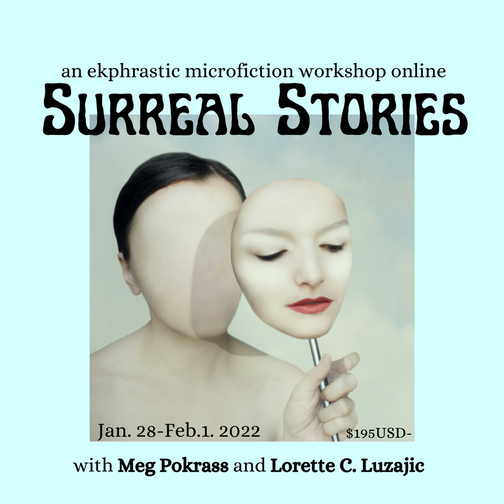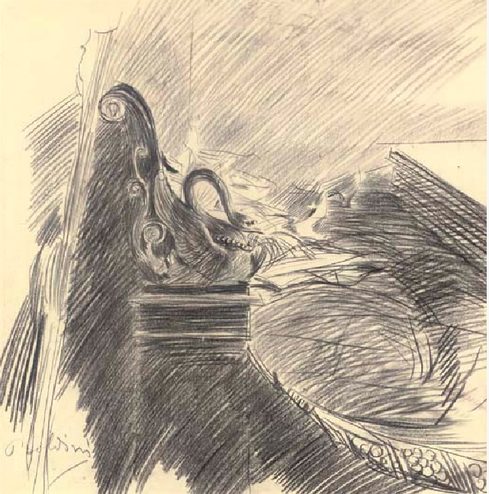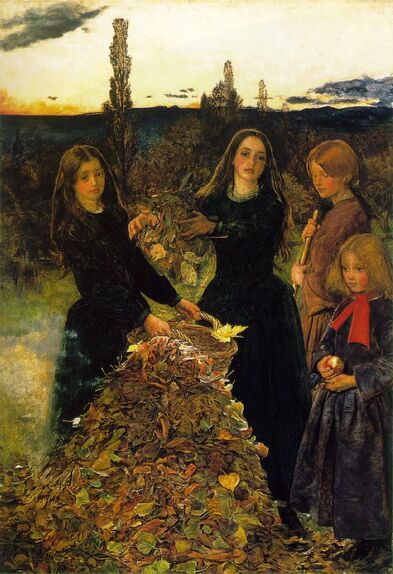|
Wind Protector Cousins these spirits, old Wendigo the ash gray creature of native terror and childhood fear who hunts in nighttimes darkest haunts, and Wind Protector caretaker of moonlight running as a spirit faster than mere movement, legend of peace in the making loving and fatherly born from midwives hewn hands and the forests hand me downs, swift, hushed, only ears feel his great mystery as hidden animals with green nocturnal vision, housed within knotted secret underbrush, faintly hear his circling rush of breath, beyond day, healing is on dark night paths, quiet redemption among algae and decay, his wide windswept arms reach for what he can't stop to embrace, rooted, anchored in place. Daniel Brown Daniel Brown is a retired Special Education teacher. His poems include a variety of styles and subjects from Haiku to poems about music, art and social issues. Daniel’s work has been published in Chronogram, Jerry Jazz Musician And Mightier: Poets For Social Justice among others. He reads his poetry from time to time on his YouTube channel “Poetry From Shooks Pond” and is working on his first collection Family Portraits in Verse. He lives in Red Hook, New York.
2 Comments
It Was All Too Much Hidden behind a wash of red, she’s gone. Bare outlines of her body clipped in angry strokes. She lies back, collapsed. The head a contusion, a dark scratching, a rage turned numb and covered. She doesn’t want to see her face for fear the tears will wash the paint away. ** You Kept It Coming “I will not be quiet, I will not turn myself inside out to bury suffering”, she says. The body laid out on the bed as if she wants to care for it but cannot. The head exhausted, destroyed. ** Because You Kept Touching Me I’m bruised. I paint the parts you touched, over and over with black. To get this on the wall I threw the anger at it, but then the sorrow overwhelmed me, set the painting free. John White John White is a writer and BAFTA Award Winning TV & cross-media Director/Producer. He has been writing poetry for many years and was first published in Michael Horovitz’s seminal avant-garde review New Departures. He graduated in 2021 from the London Poetry School/Newcastle University UK Writing Poetry MA. Recently he has had poems in the New European newspaper and Alchemy Spoon, and he has a performance poem on New Boots and Pantisocracies at: https://newbootsandpantisocracies.wordpress.com/2020/06/21/postcards-from-malthusia-video-interlude-1-john-white/ Twitter: @johnwhiteprods It’s Always Something The aspen doing something in the wind – Robert Hass In the dream I wander deep halls in the Museum of Lost Meaning. The saints were busy conferring about something in the della Francesca. A resurrection of cranes stood aloof and rigid, a black-eyed junco half-way off the frame. (Even the magpie seems to have been struck dumb.) While an approximation of angels held the silent O of their lips and looked toward heaven – the notion of God doing something to their souls. Is there a word for all the unsayable confines of the world? Something beyond conformity, just this side of dismissal? As the undercurrent of years does something to your life. All those hours spent comparing one beauty to another, whether on the canvas or beyond the gallery doors – the moon doing something in the sky. Tina Schumann Tina Schumann is a Pushcart nominated poet and the author of three poetry collections, Praising the Paradox (Red Hen Press, 2019) which was a finalist in the National Poetry Series, Four Way Books Intro Prize and the Julie Suk Award; Requiem. A Patrimony of Fugues (Diode Editions, 2017) which won the Diode Editions Chapbook Competition and As If (Parlor City Press, 2010) which was awarded the Stephen Dunn Poetry Prize. She is editor of the IPPY-award winning anthology Two Countries. U.S. Daughters and Sons of Immigrant Parents (Red Hen, 2017). Schumann’s work received the 2009 American Poet Prize from The American Poetry Journal, finalist status in the Terrain.org annual poetry contest, as well as honourable mentions in The Atlantic, Crab Creek Review and The Allen Ginsberg Award. She is the poetry editor for Wandering Aengus Press and her poems have appeared widely since 1999, including The American Journal of Poetry, Ascent, Cimarron Review, Michigan Quarterly Review, Nimrod, Parabola, Palabra, Poetry Daily, Poemeleon, Rattle, Verse Daily, and read on NPR’s The Writer’s Almanac. www.tinaschumann.com To Your Pain and My Declining Ability to See She presented you with her hair scrunchie a week ago to wear on your wrist in public, at school, when you’re with the guys at the pool, or lingering in the parking lot just before soccer practice. It changed your gait, this bluish-gray, silky iridescence, billowy on your slim wrist—an awkward corsage, a colour full of morning fog and promise. My students tell me this is a thing now. Like a ring, they keep saying. But today you are sprawled on your bed, diagonal, away from us. I think of Thiebaud’s Supine Woman. She’s flat on her back on white, lots of white. Tired of being her. Close up, the lines are thick, so straight-ish, she can’t move a tick—maybe she doesn’t want to move—her eyes held straight up—the lines thinner around her thighs, her shape, her white dress, barely visible, separate from all the space, all the tenable white. But we know that these lines, any lines, tell us nothing but that they are there. Yes, you’re her opposite, in form, too, your head stuffed down deep into the bed, on top of the blanket your mom laid there to warm you this past fall—the same scrunchie color now not on your wrist, not anywhere I can see. When you turn over, your tears are resting in the corner of your eyes, thick and obvious— like his paint, like those lines-- but only to the one who chooses to stand close enough to begin to see, especially to the one who chooses to attend to the lines, on this bed, usually so thin. Jacob Stratman Jacob Stratman’s first collection of poems, What I Have I Offer With Two Hands, was released in 2019 through the Poiema Poetry Series (Cascade Books). He teaches in the English department at John Brown University in Siloam Springs, Arkansas. 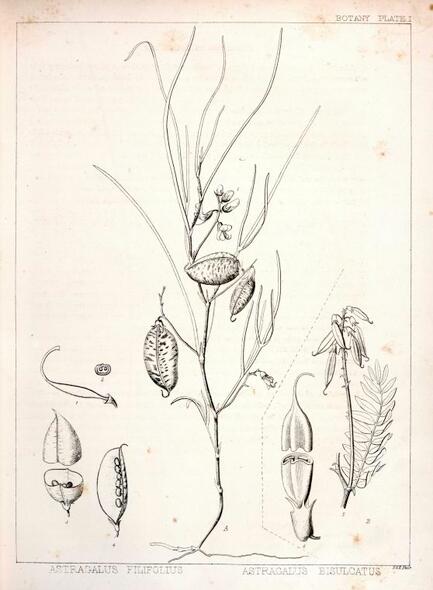 General Research Division, The New York Public Library. (1860). A. Astragalus filifolius, 1. Pistil enlarged, 2. Cross section of the ovary enlarged, 3. Legume transversaly divided, 4. Same longitudinally divided; B. Astragalus bisulcatus, 5. Fruit with a leaf, etc., 6. Fruit, with the calyx, etc., transversely divided, enlarged to thrice the natural size. Retrieved from https://digitalcollections.nypl.org/items/510d47d9-5384-a3d9-e040-e00a18064a99 Pistil 1. My heart took root. Legs underwater. Legs in the sink. Legs in the garden. Legs all the way basement down. 2. I was born inside a peach pit. You bit the stone. Juice dripped down your chin. 3. When they cut my soul in half to look for worms they found stray pink yarn. 4. When they cut my brain in half to look for worms they found silk ones spinning legacies. 5. The baby with a leaf growing out of her-his head. 6. I shattered the crib with all my futuring. Soon to be soon to be soon to be. Phonipara Zena The sun was an orange USB drive that held every photograph from when we were children: sandbox, slate, pocket knife, bond fire, bone. We stood back to back then walked the length of our branches. Yellow catastrophe. Yellow song. All the old music from when we could easily download the world. What did I know about waiting? We were finches. Flower necks could hold us. List of Plates
Ostèologie de la perche Together we traced Pangea beneath your face. Filled in what lapses the ocean would take dominion over. Sometimes I want to be a 24/7 submissive. Want to empty myself of everything but service. Who out there would like to use my bones? With a paring knife, I slip one out and place it beneath my mother’s bed. Baby teeth are recycled. Your mother’s baby teeth are your baby teeth and so on and so on. Once I lied to my mother and said the “mother” in my poems is not her but the idea of a mother. What is the distance between the idea of something and the real walking body? Charting the continents, the shorelines change. Sometimes I have ribs and sometimes my chest is just wide open. A skull within a skull. “No more drifting. There’s not enough time. We need to race,” says the tectonic plates. An earthquake names itself after your birthstone. Leopard I wanted to take back my detail. Peel the outline like a rind and walk unblotted and staining. Wearing all white in the middle of a field. All I can see is eyes. Running as fast as a car until my knees become bullets. Bullet proof glass. Resting peacefully in the stippling. A point for every single mouth. The scream collection. Hilltop gazing at the circus tent as it’s hoisted against the mountain backdrop. Soon, a Shakespeare festival will gather in the dark and perform the old story of my name as fast as they can. Rushing through lyrics until there’s only gesture. The best stories are stretched against sound and velocity, not words. I wanted you yesterday. Now all the peaches are rotten. We’ll have to eat each other. Robin Gow
Robin Gow is a trans poet and young adult author from rural Pennsylvania. They are the author of Our Lady of Perpetual Degeneracy (Tolsun Books 2020) and the chapbook Honeysuckle (Finishing Line Press 2019). Their first young adult novel, A Million Quiet Revolutions is forthcoming March 2022 with FSG Books for Young Readers. Gow's poetry has recently been published in POETRY, Southampton Review, and Yemassee. They live in Allentown Pennsylvania with their two pugs and work as a community educator. A treasure trove of responses are up for the Sonya Gonzalez painting above. Click on image to read them!
Intricacy of Calm As my mother lay dying, body wracked in pain, day in, day out, her bed rested six feet shy of tranquility’s settling vision-- a delicate depiction of beauty’s peace at rest. The Lacemaker graced my mother’s nearby wall, portraying full elegance of repose— attentive rest while at intricate work. Jan Vermeer’s painting begged any observer, even my mother, to close her eyes, watch her breath, slowly open them once more, then take a broad glance at calm: the skill of twisting air to thread, of braiding silk from strands of wonder, or even spinning lace with unseen turns of thoughtful fingers. Where did my mother’s eyes rest when they looked towards that beige-boring wall? Directly on the painting by Vermeer? Perhaps they, as mine now do, focused on the peace of the lacemaker’s hands, the serenity in her face. I think of the memories my mother’s gaze may have evoked in her— maybe the time she learned from her own mother of tempered mastery, the slow, elaborate patience required to sew. Could she ever imagine a time when I, her daughter, would recall that steady tenacity at stitching, the requisite resolve, I once learned from her? Now, as my eyes peer anew at this very same Lacemaker, which today graces my wall, I breathe a spirit of quiet, of acceptance, its full thoughtful, repose. Judith Brice Judith Brice is a retired Pittsburgh psychiatrist whose love of nature and experiences with illness inform much of her work. She has had over 80 poems published in journals and anthologies, including in The Golden Streetcar, Voxpopulisphere.com, The Pittsburgh Post-Gazette, The Magnolia Review, and Annals of Internal Medicine, among others. Judy has twice received the Editor’s Choice Award in The Allen Ginsberg Poetry Prize, sponsored by The Paterson Literary Review. Judy delights in four poetry books: Renditions in a Palette, Overhead From Longing, and Imbibe The Air all published by WordTech Communications and Shards of Shadows: A Covid Diary published by Impspired Publishing, the last two publications in January, 2021. Join Meg and Lorette for a generative microfiction workshop. The five day surrealism workshop will take place in a Facebook group and includes writing one microfiction story a day, with thought provoking prompts from a diverse array of surrealist artists.
Email Lorette at theekphrasticreview@gmail.com with SURREAL STORIES in subject line if you want to sign up! Meg Pokrass is truly the queen of the microfiction genre- she is a founder of the Best Microfiction Anthology Series and has published hundreds of micro stories in journals, books, and Norton anthologies! Lorette C Luzajic is the founder of The Ekphrastic Review. Join us! Spiccato My pencil skitters across the page as I begin to block in the composition. “I wish you’d settle,” she grunts. A familiar complaint. Mother still blames me for father’s early departure. He’d packed his bags long before I had the chance to memorize his face. “I can’t hear myself think,” his parting words, the determined smell of his Toscano cigar leaving a trail I never followed. “Just warming up for your portrait,” I breathe into her ear, but she’s already heaving herself out of my bed, the bedclothes traveling with her, my sketchpad bouncing to the floor. I lean over, grab my pencil, check the point for damage, grab the covers and pull them back over my knees. Francesca teases that if I’m not painting or drawing, sharpening my pencils, or in the cafes trading scribbles for paper or canvas, my world might come to an end. She implores me to bathe as often as I clean my brushes, to occasionally take her out for a stroll, her public chance to posture and puff. Mid-morning sun pours in, illumines the Arches paper. My lover may have left, but I resolve to prove her wrong. I readjust the pad, fill in the swan. Mikki Aronoff Mikki Aronoff’s writing has appeared or is forthcoming in The Ekphrastic Review, Virga, Intima: A Journal of Narrative Medicine, London Reader, SurVision, Rogue Agent Journal, Popshot Quarterly, South Shore Review, The Fortnightly Review, Gentian Journal, Feral: A Journal of Poetry and Art, and elsewhere. A two-time Pushcart nominee, she is also involved in animal advocacy. Seasons on Fire Four women in the field. Three young women and a little girl. Late afternoon, trying to accomplish her job, gathering a pile of leaves to make a bonfire and, then, like vestals of modern times, they will be offering it to the sky; more than odor of burning leaves, incense from departing summer. Executors and witnesses to the seasons’ change, to which, inevitably, all of us are chained. The two eldest feed the funeral pile, properly dressed in dark clothes, while the youngest, indifferent and incomprehensible to the moment, feeds herself. The land will become bare and virgin, sanctified and prepared for the miracle of spring. In the background, the sun, that gilded the day, prepares itself for the retreat: will make its journey to brothers beyond horizons, remaining, however, its promise, never broken, of eternal and daily reborn. Edilson Afonso Ferreira This poem was first published in The Lake. Mr. Ferreira, 77 years, is a Brazilian poet who writes in English rather than in Portuguese. Widely published in international literary journals, he began writing at age 67, after his retirement as a bank employee. Has been nominated for the Pushcart Prize, and his book Lonely Sailor, One Hundred Poems, was launched in London, in November of 2018. He is always updating his works at www.edilsonmeloferreira.com. |
The Ekphrastic Review
COOKIES/PRIVACY
This site uses cookies to deliver your best navigation experience this time and next. Continuing here means you consent to cookies. Thank you. Join us on Facebook:
Tickled Pink Contest
April 2024
|
